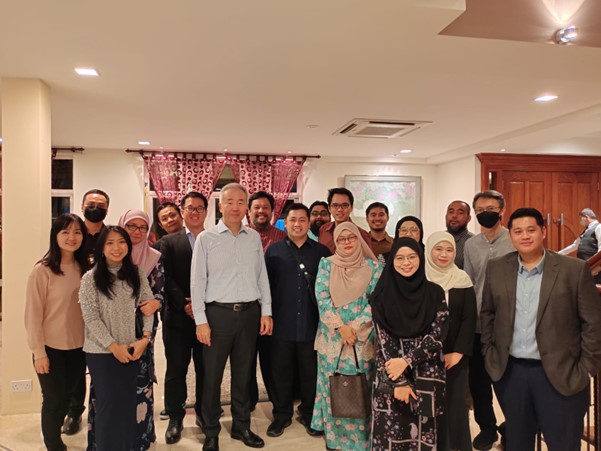Mohammad Raymie Othman, a teacher from Brunei Darussalam came to Japan and experienced the 2011 Tohoku earthquake and tsunami. Since returning to Brunei, he has been helping to guide young Bruneians who are interested in studying in Japan while working as a teacher. (The photo above is BAJA members celebrating with H.E Ambassador of Japan to Brunei Darussalam, Maeda Toru at his residence. BAJA works closely with the Embassy of Japan.)
Accepting the challenge and coming to Japan
– What led you to Japan?
I have been in Japan for 3 years, with 1 year dedicated to studying Japanese language and 2 years pursuing master’s degree. During this time, my research focused on natural product chemistry, specifically attempting to extract toxins from jellyfish and convert them into medicine.
What brought me to Japan was a truly unique opportunity. I first learned about it while I was teaching in Brunei when an administrator recommended that I apply to study in Japan. Initially, I had been aiming to study in the UK and had even secured a government scholarship for that purpose. However, it became apparent that many other students were choosing to study in the US, the UK, and Australia. At that time, pursuing studies in Japan presented a distinct and extraordinary opportunity. I was drawn to the culture, the politeness, and the punctuality of the Japanese people, which deepened my appreciation for this country.
During that time, Japan’s image was not entirely positive due to the frequent natural disasters, the perception of high costs, and the notion that Japanese food might be challenging to adapt to. However, I aimed to demonstrate a different perspective, that of a survivor who could navigate and appreciate the country despite these challenges.
– How was your experience of studying and living in Japan for 3 years?
My experience in Japan was incredibly enjoyable, filled with a wide range of experiences, both good and bad, which have shaped the person I am today.
My first year in the master’s was particularly challenging. My coursework was entirely in Japanese, which meant I had to work twice as hard in that first year. I needed to listen and engage in discussions in Japanese, and it was tough because my one year of prior Japanese study had mainly helped me to navigate daily life in Japan, but it wasn’t sufficient for academic purposes. Fortunately, I had a very supportive professor at my university who helped me a lot. This support allowed me to focus on my research while simultaneously helped my family to acclimate in living in Japan. We were allowed to explore various parts of Japan, a situation that often made my colleagues quite envious. For me, it felt like hard work, and a vacation rolled into one because I had the opportunity to travel from the northern regions of Hokkaido to the southern paradise of Okinawa, for research and also pleasure.
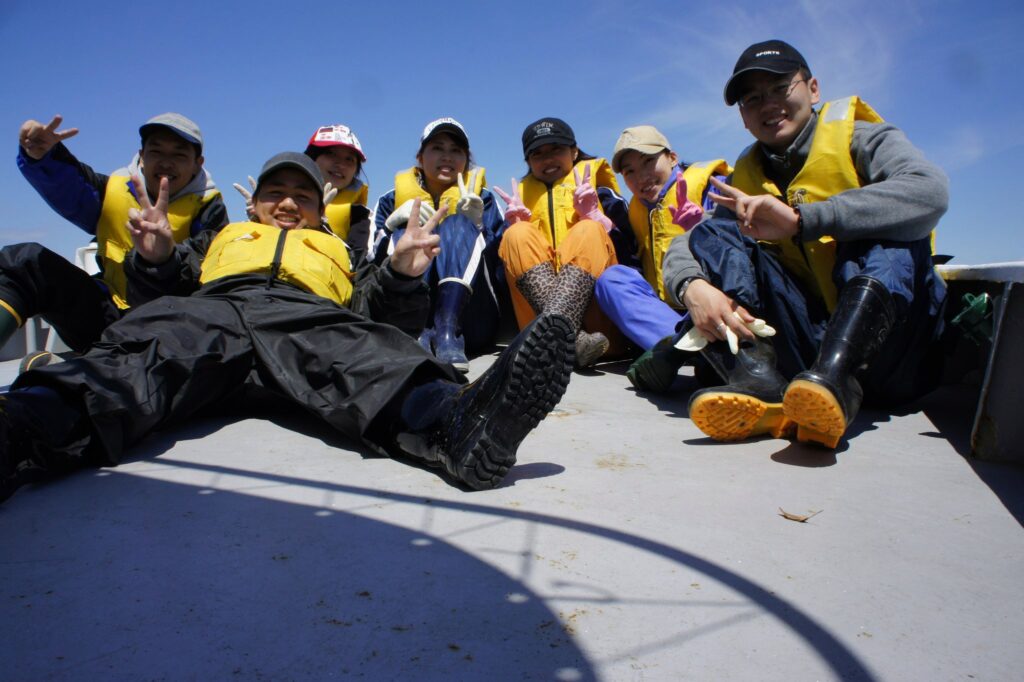
Lifestyle adjustments
and a lesson of punctuality from Japanese people
– Can you share any cultural or lifestyle adjustments you had to make when you first arrived in Japan, and how have these changes impacted your daily life?
In general, my time in Japan was quite smooth due to my adaptability. During my master’s program, my professor and fellow master’s colleagues frequently extend invitations to my family and me for weekend outings to the beach, where we engage in collecting marine animals for research purposes and gather razor clams for barbecues. The warm reception extended to my family by our Japanese acquaintances facilitated a seamless integration into the local lifestyle, making the process of building relationships notably smooth for us.
However, I had to make a significant adjustment regarding punctuality because, in Brunei, it is usual to be late for one hour. While it has improved since then, during my initial days in Japan, this was a challenge. Punctuality is very important in Japan. I vividly remember the moment when I was late for the second time, just by 3 minutes, as my daughter was unwell. My sensei (professor) kindly reminded me of the importance of not making my colleagues wait, especially since it was my turn to speak in the session. My tardiness disrupted the schedules of my professor and colleagues, causing them significant inconvenience. I was deeply embarrassed, and from that moment, I resolved never to be late again. I applied this lesson not only to my academic life but also to my personal life, teaching it to my daughter. It has become a part of my own culture now, incorporating Japanese values into my daily life.
Similarity between Muslim spirit and IKIGAI
– You were in Japan during the big earthquake in 2011. Can you share with us about that time?
My first experience with a significant earthquake was unforgettable. It was a frightening moment; my college mates were in tears. Oddly, I remained calm and even found myself smiling. I couldn’t quite explain why. When one of my colleagues asked me why I wasn’t scared, I responded that it was my first time experiencing such an event, so, in a strange way, I found it fascinating – an “ii keiken” (good experience), as I put it.
Before I came to Japan, my colleagues in Brunei advised me not to go, citing risks like natural disasters. However, my perspective was different. I have come to understand the importance of seizing opportunities as they arise. I thought, ‘If I am meant to face these challenges and even the possibility of dying there, so be it. It’s my path.’ With that mindset, I accepted everything that came my way. In the face of unexpected circumstances, I perceive them as inherent aspects of life, from which I derive valuable lessons and progress onward. This perspective aligns with my beliefs as a Muslim, emphasizing acceptance of God’s providence, learning from the experiences, finding contentment, and persevering on our journey.
I’m a Muslim and in our religion, we’ve embraced the belief that everyone has a unique purpose in life. Interestingly, I’ve discovered a similarity in this belief with the concept of IKIGAI among the Japanese people. This insight has inspired me to incorporate the concept of IKIGAI into my teaching career, helping my students to discover and pursue their life’s purpose.
Moreover, from that earthquake experience, I gained valuable insights into how Japanese people handle safety measures during emergencies and natural disasters. In Japan, everything is highly organized with well-defined procedures for what to do and what not to do. They meticulously outline every step. On the contrary, Brunei seldom experiences natural disasters or emergencies. Consequently, when such events do unfold, our lack of preparedness can lead to chaotic situations. However, it is noteworthy that Brunei is rapidly progressing and enhancing its preparedness measures.
Working in BAJA to foster education
and relationships between Brunei and Japan
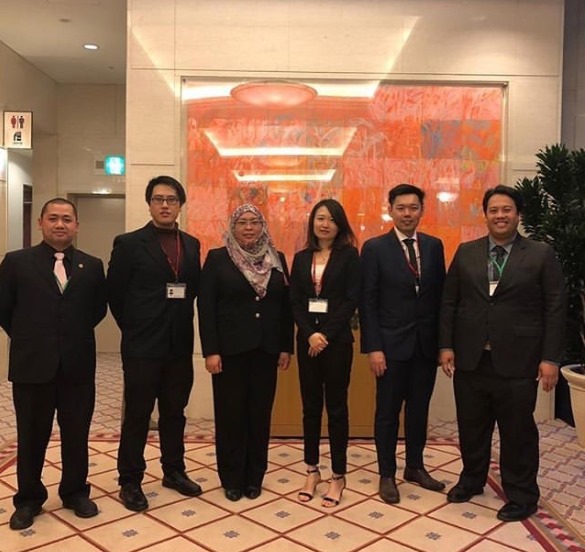
– What is BAJA?
BAJA, the Brunei Association Japan Alumni, actively collaborates with other Japanese alumni organizations across Asia, fostering connections and relationships among students in Brunei, Japan, and various other countries.
– What is BAJA’s role in strengthening bilateral ties between Japan and Brunei?
We engage in partnerships with NGOs to offer week-long programs, giving students from Brunei the opportunity to immerse themselves in Japanese culture and gain insights into Sustainable Development Goals (SDGs).
Furthermore, we work closely with the Japanese embassy to promote Japanese education. We assist in the selection process for MEXT (Ministry of Education, Culture, Sports, Science, and Technology) scholarship recipients, participating in interviews and educating the next generation of MEXT students. We conduct workshops to instill the necessary mindset and preparations for life in Japan, share the pros and cons of studying there, and outline the do’s and don’ts specific to MEXT students.
In my role, I collaborate with the career department to disseminate information on how to secure MEXT scholarships and identify suitable universities for various fields of study. Each year, we also helped organize and participate in a Japanese culture festival in conjunction with the Japanese embassy, where we set up booths to guide individuals interested in studying or working in Japan, directing them towards the appropriate pathways.
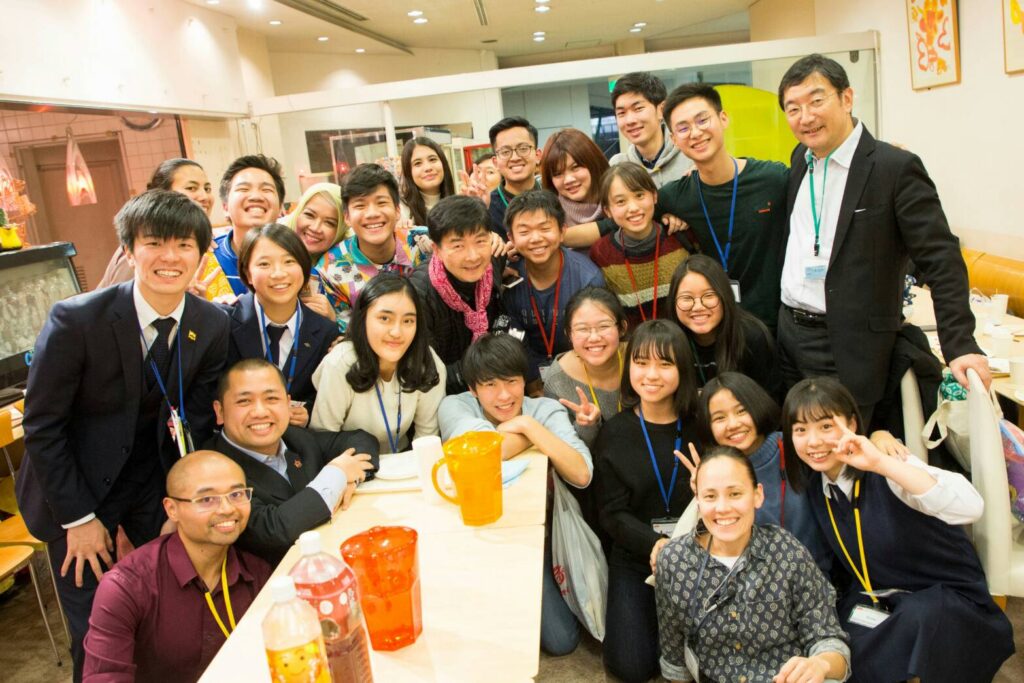
– Do you have any hopes or expectations about BAJA activities in the future?
I hope that BAJA can expand its focus to include Halal tourism in Japan, especially given its increasing popularity. We aspire for BAJA to collaborate with organizations like the ASEAN-Japan Centre to promote Halal tourism not only in Japan but also in other countries, such as Viet Nam and Korea.
Other than that, BAJA aims to serve as a vital bridge connecting Brunei, Japan, and other nations in the education sector. We aspire to facilitate more student exchange programs, providing students with opportunities to experience Japan. These programs have been highly effective, with many students expressing a strong desire to return to Japan for further studies, even if they initially lack in-depth knowledge of the language and culture. Additionally, our goal is to continue promoting more MEXT programs, encouraging students to explore studying and working in Japan.
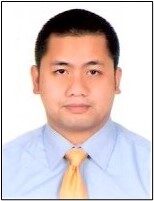
Mohammad Raymie Othman
An education Officer (PG3) at Maktab Sains Paduka Seri Begawan Sultan, Brunei. Masters (MSc) in Marine Science – Natural Product Chemistry/ Biochemistry at Tokyo University of Marine Science and Technology (TUMSAT). Executive Member – Secretary of Brunei Association Japan Alumni (BAJA).
Interview and text: Mimi Le
Photos: Mohammad Raymie Othman


